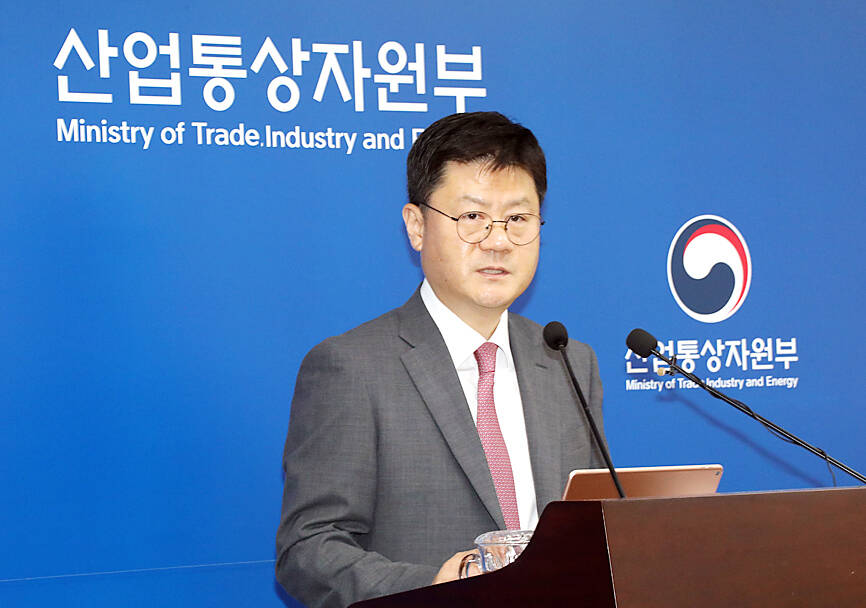South Korea’s export growth accelerated last month, reflecting resilience in global demand, as the artificial intelligence and technology sectors drive record gains in semiconductor sales.
Average daily shipments increased 12.4 percent from a year earlier, data released yesterday by Korea Customs Service showed, compared with 9 percent growth in May.
Headline exports, which do not reflect differences in the number of working days in the reporting month, rose 5.1 percent to US$57.07 billion, while overall imports fell 7.5 percent to US$49.07 billion. That resulted in a trade surplus of US$8 billion, the biggest since 2020.

Photo: EPA-EFE/Yonhap
The value of semiconductor shipments amounted to US$13.4 billion, soaring 51 percent from a year earlier last month, the South Korean Ministry of Trade, Industry and Energy said in a statement.
Display products rose 26 percent and exports of computers increased 59 percent from a year earlier, while the sales of wireless communications devices advanced 3.9 percent, the ministry said.
Demand from the US led the gains in exports, with shipments to the world’s largest economy rising 14.7 percent from a year earlier to US$11.02 billion last month, while sales to China increased 1.8 percent to US$10.7 billion, marking a fourth month of growth.
South Korea’s largest trade surplus since September 2020 supports the view that the economy might grow more than previously forecast this year.
It also suggests that the weakening of the local currency is forcing importers to cut back on purchases from abroad, Korea International Trade Association analysis and forecasts director Austin Chang said.
In a separate survey released yesterday by the Federation of Korean Industries, South Korean firms said stability in the foreign exchange market ranks as the most important policy objective from their perspective.
They see 1,332 as the preferred level for the won against the US dollar, the survey showed.
The won was about 1,378 against the US currency mid-morning yesterday.
Almost two-thirds of major South Korean companies in the survey said they expect exports to keep rising in the second half of this year.
Separate data released yesterday also pointed to continued strength in the factory sector, as S&P Global’s manufacturing purchasing managers index rose from 51.6 in May to 52 last month, its highest since April 2022.
While the outlook for exports remains bright, South Korea might face the risk of cheaper goods from China if the world’s largest manufacturing country floods the market with them to ride out its economic trouble, Chang said.
Meanwhile, South Korean businesses might also have to grapple with stronger trade protectionism and fewer tax incentives in the US in the longer term, should former US president Donald Trump retake the White House in November elections, he added.

NEW IDENTITY: Known for its software, India has expanded into hardware, with its semiconductor industry growing from US$38bn in 2023 to US$45bn to US$50bn India on Saturday inaugurated its first semiconductor assembly and test facility, a milestone in the government’s push to reduce dependence on foreign chipmakers and stake a claim in a sector dominated by China. Indian Prime Minister Narendra Modi opened US firm Micron Technology Inc’s semiconductor assembly, test and packaging unit in his home state of Gujarat, hailing the “dawn of a new era” for India’s technology ambitions. “When young Indians look back in the future, they will see this decade as the turning point in our tech future,” Modi told the event, which was broadcast on his YouTube channel. The plant would convert

‘SEISMIC SHIFT’: The researcher forecast there would be about 1.1 billion mobile shipments this year, down from 1.26 billion the prior year and erasing years of gains The global smartphone market is expected to contract 12.9 percent this year due to the unprecedented memorychip shortage, marking “a crisis like no other,” researcher International Data Corp (IDC) said. The new forecast, a dramatic revision down from earlier estimates, gives the latest accounting of the ongoing memory crunch that is affecting every corner of the electronics industry. The demand for advanced memory to power artificial intelligence (AI) tasks has drained global supply until well into next year and jeopardizes the business model of many smartphone makers. IDC forecast about 1.1 billion mobile shipments this year, down from 1.26 billion the prior

People stand in a Pokemon store in Tokyo on Thursday. One of the world highest-grossing franchises is celebrated its 30th anniversary yesterday.

Zimbabwe’s ban on raw lithium exports is forcing Chinese miners to rethink their strategy, speeding up plans to process the metal locally instead of shipping it to China’s vast rechargeable battery industry. The country is Africa’s largest lithium producer and has one of the world’s largest reserves, according to the US Geological Survey (USGS). Zimbabwe already banned the export of lithium ore in 2022 and last year announced it would halt exports of lithium concentrates from January next year. However, on Wednesday it imposed the ban with immediate effect, leaving unclear what the lithium mining sector would do in the